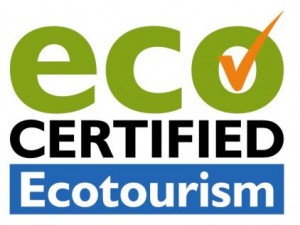In the world of sustainability, the concept of accreditation or certification for “green,” “just,” or otherwise “sustainable” products is often applied in markets for which it is believed that some consumers would pay a premium for the “more responsible” product. Examples are easy to find. Here are a few.
Ecotourism is an area that desperately needs this sort of accreditation system. Apparently, the tourism market is one with discerning consumers; they seek out tourism providers offering “ecotourism” experiences. This despite the fact that there is no uniform standard as to what ecotourism means and there is not an international organization checking to see if companies claiming to offer “ecotourism” experiences are actually doing something more “sustainable” than those that are not, or that their actual practices match their claims.
There are a few world regions that have accreditation systems in place. Australia has Ecotourism Australia, which certifies tourism operators in that country. It offers several levels of certification for tourism operators in natural areas with different levels of commitment to environmental integrity, resource conservation, interpretation expertise, and “helping local communities.” They collect application fees and dues from all certified operators. They audit certified operators every three years.
The Costa Rican Tourism Board offers the Certification for Sustainable Tourism Program (CST), which was “designed to differentiate businesses of the tourism sector, based on the degree to which they comply with a sustainable model of natural, cultural, and social resource management.” It is regulated by the Costa Rican National Accreditation Commission, which looks at (from the website):
1: Physical-biological parameters – Evaluates the interaction between the company and its surrounding natural habitat.
2a: Infrastructure and services (exclusive for lodging companies) – Evaluates the management policies and the operational systems within the company and its infrastructure, regarding the energy saving, water polluting and waste handling policies and technology.
2b: Service management (exclusive for tour operator agencies) – Evaluates the processes by which the company considers all the elements internal and external, and designs touristic products in accordance with the trends of the market and the proper characteristics of the country and places where it operates.
3: External Client – Evaluates the interaction of the company with its clients in terms of how much it allows and invites the client to be an active contributor to the company’s policies of sustainability.
4: Socio-economic environment – Evaluates the identification with the adjacent communities, analyzing, for example, the degree to which the tourist companies answer to the growth and development of the region, with the generation of new employment or the achievement of benefits in pro of the collectivity.
The CST provides grades, 0 through 5, to affiliated companies based on their achievement in each of these four areas. It is not clear from the website whether or how frequently audits are done once providers are certified.
There are also a few international efforts at accreditation, but so far none have established themselves as the standard bearer. These include Sustainable Travel International’s Impact Monitoring System and the Green Globe Certification, which is offered to “sustainable tourism” operators generally, not only ecotourism.
The issue is that when there are multiple organizations offering accreditation, they tend to compete with one another for operators who might seek their affiliation. The incentive is for accreditors to lower standards or to be lenient and look the other way when operators are not meeting standards. This is the case whether the accreditors are global or regional, as regions compete with one another for ecotourism travelers.
It is encouraging that global efforts exist, but it is important that a single standard bearer be established so that the accreditation can become a reliable and substantive part of the ecotourism culture and economy.


Leave a Reply